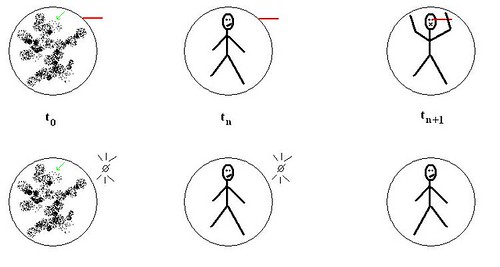Adverts help to support the work of this non-profit organisation. To go ad-free join as a Member.

Looking for evidence of free will
#31
Posted 11 May 2008 - 05:29 AM
#32
Posted 11 May 2008 - 06:13 AM
in the social stratus we really don't care if others have free-will or not
#33
Posted 11 May 2008 - 06:15 AM
I choose to use my Free Will and choose not to reply this thread/topic or advance any biblical-God-given-free-will theory any further!
have you read this?;
http://www.benjaminf...com/Howthe.html
here's a snip;
"At the very dawn of history humans began farming along the banks of Euphrates river. People soon started digging canals. The resulting cornucopia created a population boom. Fights between alpha males escalated into a never-ending frenzy. From these constant battles for supremacy arose a tyrant who created a system for manipulating and controlling large masses of people. It was a system of laws combined with a system of mind control. His name was Hamurabi. His system of mind control was to create a book combining folk wisdom with propaganda. Because he could not be everywhere at once, he created the idea of an omnicient, omnipresent being that could see all and know all. In the book where this idea was introduced, Hamurabi had himself referred to as Abraham. Later a symbol of that god was created: it was an all seeing eye on the top of a pyramid.
So, while the Mesopotamian people built on the idea of an almighty God, there also actually existed, behind the scenes, a bearded man on a throne with god-like powers over his people. To control and awe his people, great displays of miracles and wonders were engineered."
Edited by abolitionist, 11 May 2008 - 06:17 AM.
sponsored ad
#34
Posted 11 May 2008 - 06:26 AM
i suspect that when we get uploaded to computers/internet and when we don't have a way to protect us, then other hackers will completely dominate our wills
It wouldn't matter, you would still die and your 'copy' wouldn't suffer
#35
Posted 11 May 2008 - 08:50 PM
Does anyone have any evidence that would support the theory of free-will?
How about a good reason to believe that we have free-will?
If you mean free will as in "I do what I want to do, to the extent of my possibilities, and am willing to take responsibility for it, at least to some extent", even if what I actually want to do has already been entirely predetermined, time and again, by circumstances external to me, that I had no way to influence, then in the vast majority of cases we have free will.
If you mean free will in the sense "I'm doing that thing I just choose to do, but I could have done otherwise, chosen another thing to do instead, if only I wanted to, or for any random reason outside of my own understanding" then you suppose that in a way given one history for our universe, there could rise different futures, and furthermore, that we, as humans, somewhat get to choose those futures.
Physics is deterministic. You'd need a process generating truly random events to have different possible futures, and so you'd end up with a non deterministic universe. Furthermore, even if you could do that, there's still the issue of getting around to control and choose, at any point in our life, the outcomes of our actions. Just having a random component in your choices doesn't give you free will, it just means that instead of being the puppet of determinstic phenomenon, you become the puppet of random phenomenon.
Now until recently it seemed very clear to me that there couldn't be free will in that latter sense, since every physical phenomenon following a mathematical law is deterministic, and even quantum physics seemed to be swinging that way if you looked close enough.
Then I read about some fascinating idea derived from the self sampling assumption in an infinite (or at least very big) universe or multiverse.
Suppose the universe is indeed deterministic. Suppose it is spatially infinite too.
What is the probability to find two identical structures in that universe ? It depends on their complexity, their size. There are plenty of identical hydrogen atoms out there.
What about the probability of finding, say, a planet exactly identical to our earth, down to the atomic scale ? It is estimated that the earth is made of about 10 exp 50 atoms.
So I suppose that would give about (10^50)! different combinations of atoms, one of which is our earth (at worst). Well, you'd have to specify not just the tridimentional position of them all, but also their velocities, and much more. Anyway.
You could do the same sort of calculation and find the probability of finding two identical hubble volumes. If we just assume a spatially infinite universe, there's an infinite amount of hubble volume identical to ours anyway.
Now, granted that the speed of light holds, there's no way for you to know what's outside of your own hubble volume, and if a particle, a photon, for instance, has been travelling all the way from the outside of that volume to your eye, at the speed of light, you can only know it exists as soon as you observe it. No sooner, ever.
And so, suppose two identical hubble volumes, but in one there's a photon yet removed from your light cone, about to hit your eye, in the other, there's no such photon. The moment before it hits one of those guy's eye, they are still perfect copies. The moment after, they are different. How do you know which you were about to be ? You just can't. So, in a subjective way, relative to you as a conscious observer, that process is non deterministic. You want randomness ? Stare at the cosmological background and make a wish.

(at t=0, you see a photon -red line- approaching the limit of what is our hubble volume, or not, depending on the case. Some time after that, at t = n, it is just outside the cone of light of the wireling, or not. And the moment after, right in its eye, triggering events undreamed of beforewards.)
I'm told you get something similar when you considerate quantum physics and the many world interpretation. Hey btw, there's a series on quantum physics and the many world interpretation among others going on at overcomingbias.com for the moment.
Finally, if you like fiction, you should read Egan, there's that idea of running a quisp, a certain class of quantum computer, which, if I understand well, allows the person (upload) running on it to not have to evolve through all the possible quantum parallel universes each instant, but only one of them. If you have a certain measure of control over a random process which affects who you are and what you'll live, then you have in a way achieved a greater degree of free will.
Singleton (a short story about the beginnings of the quisp - qusp).
The Qusp itself, though, would never initiate the split. In a given set of circumstances, it would only ever produce a single response. An AI running on the Qusp could make its decisions as whimsically, or with as much weighty deliberation as it liked, but for each distinct scenario it confronted, in the end it would only make one choice, only follow one course of action.
#36
Posted 11 May 2008 - 09:21 PM
I think we are designed to subjectively experience a sense of willfulness and individual distinction that we can't just rationalize away.
The reason I think that the debate is good - is because we learn how important it is to focus on biology and environment as a society.
Don't want to be a buzz kill - i just think it's better to be compassionate and understanding of the fact that humans need help on a biological and environmental level.
Human nature gives us a tendency to objectify others and attribute what we don't like about them to their willful choices. We also have to be forgiving with ourselves for being stupid humans sometimes.
Edited by abolitionist, 11 May 2008 - 09:22 PM.
#37
Posted 28 May 2008 - 03:18 PM
Even if predetermined our actions are made by the relative sensation of free will. Hopefully, collectively, we'll all work towards Immortality in our lives. Contributing as much as possible. Knowledge whether absolute or relative is still progressive (relatively speaking) regardless.
In any event. Free will only exist with those who are not married.
#38
Posted 07 June 2008 - 04:01 AM
Truly you can break it down since, if everything is deterministic then everything is merely the effect of a previous cause, stemming back from before birth and therefore not governed by the human, though he felt his action was the result of his will.
Still i agree with affinity
#39
Posted 11 June 2008 - 05:20 PM
I choose to use my Free Will and choose not to reply this thread/topic or advance any biblical-God-given-free-will theory any further!
Getting people to analyze it at all is a good first step. Most just accept it unquestioningly as an a priori truth.
#40
Posted 04 October 2008 - 03:14 PM
An example. A simple moral conundrum. You find a wallet on the sidewalk. Do you return it? Do you keep it? Your taught by your parents that stealing is wrong, and that your should do unto others as you would have done unto yourself. Also little jimmy stole your muffin in 3rd grade and you know first hand what it feels like to being stole from. But society is putting alot of pressure on you aswell. You live in detroit, crimes pretty prevalent here so you wouldn't be the worst guy in the world if you cept the cash. You did just loose your job too, so you could use the 243.32$ in the wallet pretty badly. The various arguements go on the perverbial scale, and volia a dicision is made. Your parents have always been wise and treated you well, and your still pissed off about that f$%^ing muffin, so you do the right thing and return the wallet. From hear its up to physics, is their ID in the wallet? a phone number? Can you even find the person?
In this way, our "Free Will" is predecided for us by our knowledge and physics, and while more information can change your mind about something, that too is beyond your control. Weather you get that knowledge simpley by reading(knowledge/expirences of your life have given you a predication for reading/learning) or that knowledge is trust onto you be society. You can always just decide to do something contrary to your programming in the name of free will, but even the action of doing that is predicated by the knowledge of your past is so much as your either being rebellious because of certain events in your life, being competeivie, etc.
To me the only true "Free will" would be to decide every decision in life with a coin toss. People don't do that though, to make a decision we consult our brains memories, find similar events/knowledge about said decision from our past, and then bassed on this knowledge make a decision.
The only other place we may see free will is in the origins of life. The very first microcosmic life would have had no instincs to guide it, no genetic memories, nothing, but it propigated and evolved some how.
#41
Posted 04 October 2008 - 03:42 PM
Turns out this is a settled issue.
Edited by Savage, 04 October 2008 - 06:38 PM.
#42
Posted 04 October 2008 - 07:59 PM
Does anyone have any evidence that would support the theory of free-will?
How about a good reason to believe that we have free-will?
The best evidence I can come up with is the fact that in most of my dreams I don't feel I have control in anything I'm doing but when I'm awake I do. In those dreams it feels like another me is inside of me controlling my actions which is the main reason why I think what I'm dreaming is really happening and in reality it's always just me controlling all my actions alone.
#43
Posted 04 October 2008 - 08:15 PM
#44
Posted 05 October 2008 - 12:57 AM
Does anyone have any evidence that would support the theory of free-will?
How about a good reason to believe that we have free-will?
The best evidence I can come up with is the fact that in most of my dreams I don't feel I have control in anything I'm doing but when I'm awake I do. In those dreams it feels like another me is inside of me controlling my actions which is the main reason why I think what I'm dreaming is really happening and in reality it's always just me controlling all my actions alone.
When you are dreaming you do not have a sense of willpower?
Can you experience a sense of self without the sense that this self has power of choice?
Once you wake up you can see that it was a dream and you were just having a passive experience - but while dreaming you will inherently believe that you are engaged.
#46
Posted 10 October 2008 - 06:26 AM
- It seems very unlikely that if there were pockets of the indeterminism they would pop up just when it's time for me to make a free choice.
- Some emperically minded philosophers have theories that explain how the choice making mechanisim can interact with the indeterminism going on at a really basic level. But the experiments so far suggest that the brain doesn't behave in the way that that the theory requires.
Edited by Thales, 10 October 2008 - 06:34 AM.
#47
Posted 11 October 2008 - 03:32 AM
#48
Posted 25 October 2008 - 11:42 PM
#49
Posted 26 October 2008 - 02:01 AM
But this post made me realize something.
The best evidence I can come up with is the fact that in most of my dreams I don't feel I have control in anything I'm doing but when I'm awake I do. In those dreams it feels like another me is inside of me controlling my actions which is the main reason why I think what I'm dreaming is really happening and in reality it's always just me controlling all my actions alone.
I'm not totally sure what you are saying, but it reminded me of something. Lucid dreaming is a big hobby of mine, and when you do it for a while, you realize there is a spectrum of lucidity. Sometimes you think you are lucid, but afterwards you realize that you were barely were aware at all, just enough to know that it was a dream, and were really only slightly more conscious than a normal dream. Sometimes you are more lucid, but still it's not the same as when you are awake. And then other times, the best dreams, you think that you have the full faculties of your conscious mind. Still, when you wake up, you aren't totally sure that you were really completely intact mentally. The fully lucid dream is very rare.
That applies to real life as well. You are more or less "aware" at different times; you can do things automatically and hardly even remember doing them--that is almost like not being conscious. Sometimes you act with more purpose, but not as in control as you would have liked to have been when you think back on it; whether due to emotions, forgetfulness, or just some distraction. Other times you are totally in the moment and as fully conscious and in control as you can ever be. It's a spectrum too, just like dreaming. When do we call it "free will"? Not things done in a dream, not things done while drunk, not things done unconsciosly or in the heat of the moment--only the rare, fully aware moments of life, I suppose. But how sure of those can we be, given all the other states that the mind can be in?
And say you watch an animal, like a dog. It "chooses" whether to walk one way or another, or whether to eat or take a nap--yet would we say it has "free will"? It probably has as much choice over its actions as a human does, but it is so limited in those choices which it makes as determined by its evolutionary needs that it is almost silly to say that it has free will. Whether or not some quantum effect is allowing the epiphenomenon of its conscious mind as created by the function of its brain to actually have what we would call "free will" is almost irrelevant, given number of choices it has.
Suddenly that's how I feel too. An fly may or may not have free will, but we would laugh at the thought--it can only choose between like three or four things to do anyway. Are people really any different?
Not that I believe in it anyway.
#50
Posted 29 October 2008 - 11:15 AM
haha
#51
Posted 10 April 2009 - 04:33 PM
0 user(s) are reading this topic
0 members, 0 guests, 0 anonymous users



















































